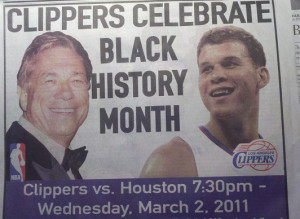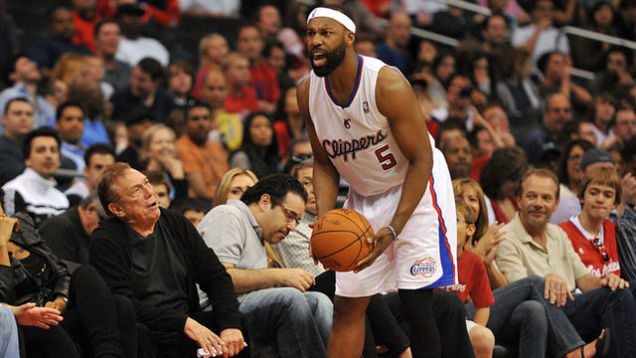Raise your hand if you knew that TMZ had a sports vision. Hell, raise your hand if you can tell me anything about TMZ besides the fact that they publish celebrity gossip.
There are many things to unpack regarding Donald Sterling’s ouster from the league, and trust me there are plenty of thinkpieces out there. Of course, one of the most interesting aspects to me is how the media precipitated and then covered Sterling’s downfall. The past four days have showcased the sports media ecosystem at the very best, all outlets doing what they’re supposed to do and proving why they are valuable.
Before the Fall
A loud refrain both before and after Adam Silver brought the ban hammer down on Sterling asked why nothing was done sooner. Why hasn’t the NBA sanctioned Sterling before? Why did coaches and players continue to sign with the Clippers? Why didn’t the media care about Sterling’s racism before?
These questions are usually asked in articles, like this one from Jamelle Bouie at Slate, that include a laundry list of offenses committed by Sterling. Insofar as these stories are critical of the NBA or society writ large, they are asking worthwhile questions. When they question the media’s silence in Sterling’s racism, however, I think they miss the point.
If you asked any moderately invested Clippers fan before this weekend if Donald Stering was a racist, they would all unequivocally say yes. How did these fans—and millions more around the league—find out that Sterling is a racist? Because the media has been writing about Sterling’s racism for a decade! How do these pieces have hyperlinks to evidence of Sterling’s racism? Because the media has been writing about Sterling’s racism for a decade!

Here is Peter Keating in ESPN The Magazine in 2009. Here is the Los Angeles Times in 2009. Here is Bomani Jones on ESPN in 2005. Here is Tommy Craggs on Deadspin in 2009. Here is Dan Wetzel on Yahoo 2009. Here is Tom Ziller on SB Nation in 2011. Here is an interview with Baron Davis in the New York Post in 2012. Here are all stories Deadspin has tagged “Donald Sterling”, 29 before these latest allegations. Hell, here I am chronicling his misdeeds in 2012 and Jacob calling him a “racist motherfucker” in 2011. And that’s just the stuff that I can quickly find with a Google search.
This is not to say the media is infallible and that there are no questions worth asking about their role in all of this. Should media outlets have pursued Donald Sterling more forcefully in the past? Should the Los Angeles Times have stopped running Sterling’s near weekly ads, and did his financial support of the paper stifle their reporting on him? Were media organizations too afraid of Sterling’s litigious nature to do real reporting? The media shares complicity in Sterling going nearly unpunished for 80 years, but don’t say they didn’t do anything.
TMZ Sports
It is still unclear how TMZ got their hands on the Sterling recording. V. Stiviano’s attorney claims she didn’t release it to them. Was the recording stolen from her? Did TMZ purchase the recording from somebody, and if so, were they purchasing stolen goods?
TMZ gets a lot of justified criticism. They’re a veritable gossip mill whose standards for sourcing and ethical conduct are reprehensibly low. TMZ photographers capture so many celebrity meltdowns because they directly cause them. They engage in checkbook journalism. They report that living rappers are almost dead. But it is also true that without TMZ’s involvement Donald Sterling would not have been banned from the NBA for life.

This story was a scoop that only TMZ could have gotten. They have spent years cultivating connections with sources within Hollywood, i.e. LA, that allowed them to get this tape. They are well-known for purchasing photographs, video, and any other noteworthy media content people are willing to sell. They engage in bottom-of-the-barrel news content, and sometimes bottom-of-the-barrel content is the most important.
It may not be ideal journalism school reporting, but a vibrant media landscape needs websites like TMZ. We need reporters willing to get their hands dirty and pursue things of dubious value. We need websites willing to flaunt journalism conventions and attack stories from completely different angles, that can break huge stories and then get them embarrassingly wrong while trying to follow-up.
Deadspin
Deadspin’s critics would contend that it is no different from TMZ. While the two do share some aspects, more accurately Deadspin is a hybrid of TMZ and a traditional sports news organization.
Like TMZ, Deadspin aggressively cultivates tips and sources. Twelve hours after TMZ released its original nine-minute tape of Donald Sterling, Deadaspin had an extended 15-minute version. It is impossible to know how this episode would have played out without Deadpin’s contribution, but its version of the tape both helped verify its veracity and gave additional evidence to Sterling’s deeply held racism.
It is becoming increasingly likely that Deadspin beats the mainstream sports media to stories. The classic example is obviously the Manti Te’o hoax, but there are numerous others such as the ESPN Horndoggery archive or the Brett Favore sexting scandal. Deadspin makes no pretense of “objectivity” or asserting that there are two sides to every story, and is therefore seen as a great place to bring information that is critical of powerful figures. By brazenly asking for tips and publishing the information contained therein more readily than other outlets, Deadspin has created a virtuous cycle of tips and sources that builds upon itself.
ESPN
TMZ’s audio went up at 1:00 a.m. ET Friday night, long after most people in America had gone to sleep. By Saturday noon the story was dominating the news cycle. Everywhere, that is, except ESPN, who had virtually no mention of the story up anywhere (as seen in the above screenshot from ESPN.com at 1:00 p.m. Saturday). This fueled criticism that ESPN was covering up the story because they are NBA rightsholders.
Those accusations are dumb, and those critics are displaying an absolute lack of knowledge about how ESPN and the news works. Especially galling was the fact that this criticism didn’t only come from your garden variety twitter morons, but reporters that should know better like Vox’s Matt Yglesias and Gawker’s Tom Scocca. This criticism ignores or doesn’t know about numerous factors.
I often characterize ESPN as a cruise ship or an aircraft carrier because it is especially difficult for them to pivot and cover a breaking story. TMZ’s audio went up at 1:00 a.m. ET, when most of Bristol was asleep. ESPN’s NBA reporters were scattered at playoff games across the country—JA Adande in Memphis, Ramona Shelburne in Portland, Arash Markazi in Oakland—and had related duties. ESPN’s editors had to wake up, understand the story, coordinate amongst themselves and assign reporters to the story. Reporters had to listen to the audio, call up owners and other sources, talk to their editors, report their stories, get them edited and eventually finalized. That shit doesn’t just magically happen.
Being the 800 pound gorilla in the room makes ESPN behave more cautiously. TMZ is used to pushing the boundaries of accuracy and legality, and has priced that into their news business model. ESPN has not, and understandably was cautious to report on unverified recordings. That is especially difficult when the recordings were in TMZ and Deadspin’s hands, organizations that are unlikely to assist a competitor. Notably, ESPN didn’t report on the story until the NBPA had released a statement on the recording, allowing ESPN to cover the statement directly without having to authenticate the recordings.
ESPN is also made up of a variety of human beings, many of whom abhor racism and would like nothing more to investigate, tar and feather a racist. Asserting a widespread conspiracy to shove Sterling’s racism under the rug is insulting to those at ESPN that were offended by Sterling’s words, and those that have suffered discrimination themselves.
Finally, the criticism ignores the ratings bonanza that this story surely generated. ESPN doesn’t release website traffic numbers, but look at how Deadspin’s normal daily pageviews have doubled or how the Clippers TV ratings have spiked during this scandal. If the story is going to be thoroughly covered by other news organizations to the point where the league can’t ignore the story, it is asinine to suggest that ESPN would ignore the millions of extra pageviews or minutes spent watching ESPN this story surely generated.
***
The media keeps those in power on their toes, and media critics keep the media on their toes. It’s not a perfect system by any means, but it is one that generally functions alright. But when criticizing the media it is worth considering the entire news ecosystem and everybody’s specific niche. Individual newspapers, websites and reporters all have their flaws, but maybe those bugs are actually features. On this story “The Media” all played their individual role, and the result is a deeply and broadly reported story that forced the NBA into its strongest ever stand against racism.

